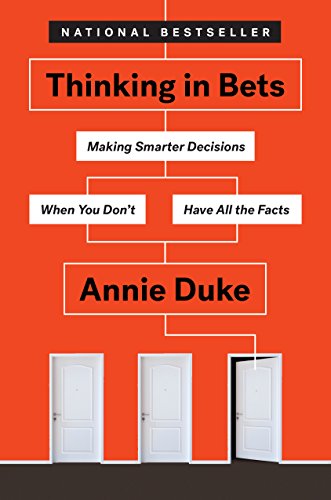8 Best-Selling Decision Theory Books Millions Love
Explore Decision Theory Books endorsed by Seth Godin, Marc Andreessen, and Daniel Kahneman, trusted experts in smarter decision making





There's something special about books that both critics and crowds love, especially when it comes to mastering decision making. Decision Theory is more relevant today than ever, with professionals across fields seeking reliable strategies to navigate uncertainty and complexity. These eight best-selling books offer frameworks proven by experts and validated by millions of readers who face choices in business, policy, and everyday life.
Experts like Seth Godin, the marketing thought leader who calls "Thinking in Bets" a must-have for anyone working with uncertainty, and Marc Andreessen, venture capitalist and tech entrepreneur, who praises its real-world applicability, highlight the practical value of these works. Daniel Kahneman, Nobel laureate whose research reshaped our understanding of judgment and decision making, also endorses these selections, underscoring their serious academic and practical merit.
While these popular books provide proven frameworks, readers seeking content tailored to their specific Decision Theory needs might consider creating a personalized Decision Theory book that combines these validated approaches to fit your unique background and goals.
Recommended by Seth Godin
Marketing thought leader and bestselling author
“Brilliant. Buy ten copies and give one to everyone you work with. It's that good.” (from Amazon)
What if everything you thought about decision making missed the real challenge of uncertainty? Annie Duke, a former professional poker champion with a background in cognitive psychology, tackles this head-on by teaching you how to evaluate choices as bets rather than certainties. You’ll learn to separate outcomes from quality decisions, understanding that good decisions can sometimes lead to bad results—and vice versa. Through examples like the infamous Seahawks' Super Bowl call and frameworks for assessing probabilities, the book equips you to think probabilistically and manage your emotions under uncertainty. If you want to improve your judgment in business, investing, or everyday life, this book offers concrete ways to rethink how you decide.
by John D. Steinbruner·You?
by John D. Steinbruner·You?
When John D. Steinbruner first explored the limits of rational analysis in government decision-making, he introduced a compelling alternative through the cybernetic theory of decision. Drawing from information theory, mathematical logic, and behavioral psychology, Steinbruner offers a nuanced framework that captures the complexity of political decisions under uncertainty and conflicting values. You’ll gain insight into how cognitive psychology complements this theory, with a detailed case study on NATO’s nuclear sharing illuminating the practical application. This book suits those interested in political science and decision processes, though its abstract nature may challenge readers seeking straightforward policy prescriptions.
by TailoredRead AI·
This tailored book explores the core principles and proven methods of decision theory, carefully aligned with your unique background and interests. It examines how to navigate uncertainty and complexity by integrating reader-validated knowledge with your specific challenges, focusing on practical decision-making tools that enhance confidence and clarity. The personalized content delves into probabilistic thinking, causal reasoning, and multiobjective optimization, revealing how these concepts apply directly to your goals. By concentrating on your individual needs, this book allows you to engage deeply with decision theory concepts that matter most to you, making the learning process efficient and relevant.
by Howard Raiffa, Robert Schlaifer·You?
by Howard Raiffa, Robert Schlaifer·You?
Drawing from their extensive backgrounds at Harvard, Howard Raiffa and Robert Schlaifer crafted a foundational text that explores how statistical methods apply to decision-making under uncertainty. You learn to navigate complex choices by quantifying risks and benefits, with insights into Bayesian approaches and decision trees that remain influential. The book suits those who want to deepen their grasp of statistical reasoning in practical decision contexts, especially academics, economists, and analysts. Chapters detailing model construction and payoff evaluation offer concrete frameworks that can be adapted across disciplines, making it a solid reference rather than a casual read.
by Vincent A. W. J. Marchau, Warren E. Walker, Pieter J. T. M. Bloemen, Steven W. Popper··You?
by Vincent A. W. J. Marchau, Warren E. Walker, Pieter J. T. M. Bloemen, Steven W. Popper··You?
Vincent A. W. J. Marchau and his coauthors bring decades of expertise to this detailed exploration of decision-making amid deep uncertainty. You’ll learn to navigate complex, unpredictable environments using five distinct approaches, including Robust Decision Making and Info-Gap Decision Theory, each clearly explained with theoretical background and real-world applications. The book also dives into how to implement these strategies effectively, addressing practical challenges and offering guidance tailored to decision makers and strategists. If you’re involved in planning where unknowns dominate, this work will sharpen your understanding of adaptive strategies and the trade-offs involved, though it demands a commitment to grasp its rigorous frameworks.
by H. Jungermann, G. De Zeeuw·You?
When H. Jungermann and G. De Zeeuw compiled these proceedings, they captured a pivotal moment in the evolution of decision-making tools that date back to the seventeenth century. You’ll explore a diverse collection of research from psychologists, economists, and organizational experts, revealing how subjective probability and utility theories intersect with human affairs. The book offers a deep dive into both theoretical frameworks and their practical implications, making it particularly suitable if you’re engaged in fields like behavioral economics or organizational decision processes. It’s not a casual read but a solid resource for those seeking to understand the foundational shifts in decision theory over time.
by TailoredRead AI·
This tailored book explores the core principles of decision theory with a unique focus on delivering rapid, personalized results across a 30-day timeline. It examines key decision-making concepts and carefully integrates them with your specific background, interests, and goals, ensuring the content matches what matters most to you. The approach reveals how decision processes unfold in real-world scenarios, breaking down complex theories into clear, actionable steps that you can follow day by day. By tailoring the journey, the book helps you build confidence and skill in making smarter choices fast, combining well-established insights with your individual learning needs to maximize understanding and practical application.
by Vira Chankong, Vira, Yacov Y. Haimes·You?
by Vira Chankong, Vira, Yacov Y. Haimes·You?
When Vira Chankong and Yacov Y. Haimes first explored the complexities of evaluating multiple competing objectives, they crafted a text that systematically breaks down the theory and methods underlying multiobjective decision making. You’ll learn how psychological value measurements and vector optimization techniques can clarify trade-offs among alternatives, with chapters dedicated to both classical decision analysis and interactive solution methods. This book suits systems engineers and decision analysts who wrestle with balancing diverse criteria and wish to deepen their understanding of structured evaluation frameworks. While dense, its methodical approach provides a strong foundation for anyone seeking to enhance decision processes in complex scenarios.
by James M. Joyce··You?
by James M. Joyce··You?
James M. Joyce is a respected philosopher whose expertise in decision theory and probability shapes this rigorous examination of rational choice. You’ll find detailed explorations of how beliefs about causal relations influence decision making, starting with foundational expected utility theory and culminating in a representation theorem that unifies causal decision theory with alternative frameworks. The book’s strength lies in its clear argumentation and technical depth, making it relevant not just for philosophers but also economists, psychologists, and AI researchers interested in decision processes. If you want a thorough understanding of causal factors in rational decisions, this book offers a precise, intellectually demanding journey.
by James O. Berger··You?
by James O. Berger··You?
James O. Berger's decades of experience at Duke University's Institute of Statistics and Decision Sciences led to this detailed exploration of Bayesian analysis within decision theory. The book introduces you to empirical and hierarchical Bayes methods, Bayesian calculation, and group decision making, expanding your understanding beyond classical paradigms. It also updates decision-theoretic concepts with modern topics like minimax multivariate estimation, offering a solid foundation for those seeking to apply statistical decision principles rigorously. If you're aiming to deepen your grasp of Bayesian frameworks and their practical applications, this book provides a thorough, mathematically grounded guide.
Proven Methods, Personalized for You ✨
Get proven popular methods without generic advice that doesn't fit your Decision Theory goals.
Trusted by thousands of Decision Theory enthusiasts worldwide
Conclusion
The collection of Decision Theory books presented here highlights three clear themes: embracing uncertainty with probabilistic thinking, balancing multiple objectives with structured frameworks, and understanding the causal and psychological nuances behind choices. If you prefer proven methods grounded in real-world examples, start with Annie Duke's "Thinking in Bets" and then deepen your statistical foundation with Raiffa and Schlaifer's work.
For those interested in strategic planning under uncertainty, combining Marchau’s insights on deep uncertainty with multiobjective decision making by Chankong and Haimes offers a robust toolkit. Philosophers and AI practitioners will find Joyce’s exploration of causal decision theory an invaluable guide.
Alternatively, you can create a personalized Decision Theory book to combine proven methods with your unique needs, ensuring that these widely-adopted approaches help you succeed in your specific context.
Frequently Asked Questions
I'm overwhelmed by choice – which book should I start with?
Start with "Thinking in Bets" for practical strategies on handling uncertainty, recommended by Seth Godin and Daniel Kahneman. It offers a relatable introduction before diving into more technical texts.
Are these books too advanced for someone new to Decision Theory?
Not at all. While some books delve into complex topics, many, like Annie Duke's, explain concepts clearly. Beginners can learn foundational ideas without prior expertise.
What's the best order to read these books?
Begin with accessible titles like "Thinking in Bets," then explore specialized works such as "Applied Statistical Decision Theory" and "The Foundations of Causal Decision Theory" to deepen your knowledge.
Do I really need to read all of these, or can I just pick one?
You can start with one that matches your interests, but combining perspectives, like practical and theoretical approaches, enriches your understanding of decision making.
Which books focus more on theory vs. practical application?
"Applied Statistical Decision Theory" and "The Foundations of Causal Decision Theory" emphasize theory, while "Thinking in Bets" and "Decision Making under Deep Uncertainty" offer practical frameworks.
Can personalized Decision Theory books complement these expert recommendations?
Yes! Personalized books tailor proven strategies from experts to your unique goals and background, providing focused insights alongside these popular methods. Try creating one here.
📚 Love this book list?
Help fellow book lovers discover great books, share this curated list with others!
Related Articles You May Like
Explore more curated book recommendations







